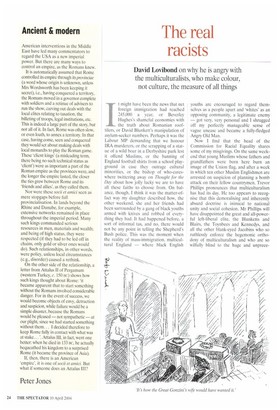Ancient & modern
American interventions in the Middle East have led many commentators to regard the USA as a new imperial power. But there are many ways to control an empire, as the Romans knew.
It is automatically assumed that Rome controlled its empire through itsprovinciae (a word whose origin is unknown, unless Mrs Wordsworth has been keeping it secret), i.e., having conquered a territory, the Romans moved in a governor complete with soldiers and a retinue of advisers to run the show, carving out deals with the local elites relating to taxation, the billeting of troops, legal institutions, etc. This is indeed a large part of the story, but not all of it. In fact, Rome was often slow, or even loath, to annex a territory. In that case, having come, seen and conquered they would set about making deals with local monarchs to play the Roman game. These 'client kings' (a misleading term, there being no such technical status as 'client') were as important a part of the Roman empire as the provinces were, and the longer the empire lasted, the closer the ties grew between Rome and its 'friends and allies', as they called them.
Nor were these socii et amici seen as mere stopgaps before full provincialisation. In lands beyond the Rhine and Danube, for example, extensive networks remained in place throughout the imperial period. Many such kings commanded serious resources in men, materials and wealth; and being of high status, they were respected (if they had to be led off in chains, only gold or silver ones would do). Such relationships, in other words, were policy, unless local circumstances (e.g., disorder) caused a rethink.
On the other side of the relationship, a letter from Attalus II of Pergamum (western Turkey, c. 150 Bc) shows how such kings thought about Rome: 'it became apparent that to start something without the Romans involved considerable danger. For in the event of success, we would become objects of envy, detraction and suspicion, while failure would be a simple disaster, because the Romans would be pleased — not sympathetic — at our plight, since we had started something without them. . I decided therefore to keep Rome fully in contact with what was at stake... '. Attalus III, in fact, went one better: when he died in 133 BC, he actually bequeathed his kingdom to a surprised Rome (it became the province of Asia).
If, then, there is an American 'empire', it is one of such et amici. But what if someone does an Attains III?
Peter Jones


































































 Previous page
Previous page